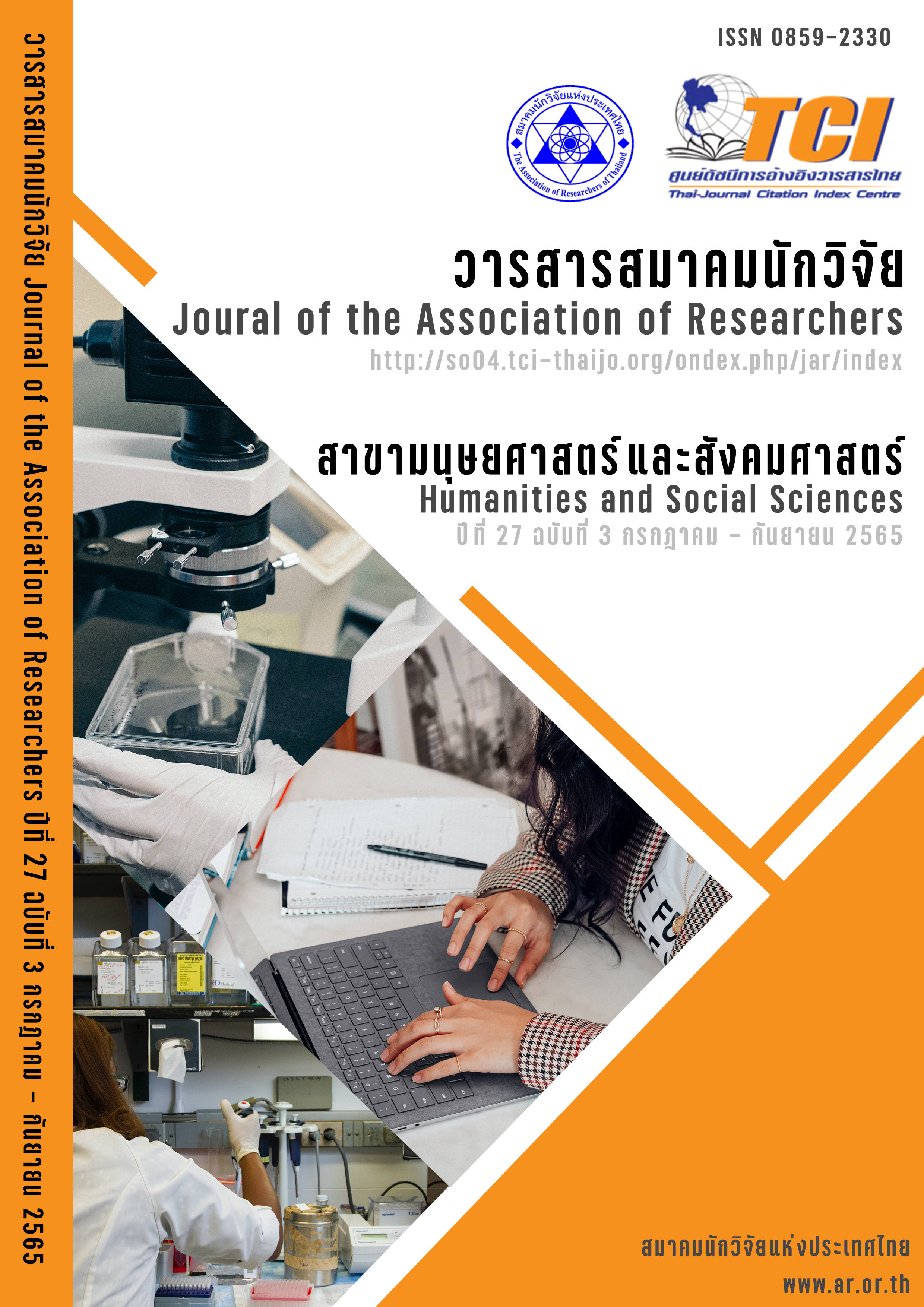Digital Leadership of the School Administrators under the Office Nakhon Si Thammarat Primary Education Service Area 1
Main Article Content
Abstract
Research subject objectives 1. to study the level of digital leadership of school administrators. 2. to compare the digital leadership of school administrators according to the opinions of educational institution administrators classified by gender, and work experience. and the size of the educational establishment; 3. to study the recommendations of the school administrators on the digital leadership of school administrators Methods for collecting information of school administrators Under the Nakhon Si Thammarat Primary Educational Service Area Office, Area 1, Academic Year 2021 consisted of 85 people. Data were collected. by using a questionnaire, The data were analyzed by frequency, percentage, mean, and standard deviation. The hypothesis was tested by statistical t-test and F-test and One-Way ANOVA, and the mean pairs were compared with statistically significant differences. using the least significant difference (LSD) method.
The results showed that: School administrators have digital leadership Overall, it's at a high-level School administrators of different sexes Having with different working experiences under which educational institutions of different sizes are affiliated There is digital leadership overall and in each aspect. There was no statistically significant difference at .05 except for digital vision. and in the aspect of promoting participation in learning There was a statistically significant difference at .05. Administrators should provide and encourage all learners to receive comprehensive technology learning. operational training to know how to use the Platform in managing their own education and should develop a self-development plan to increase leadership in the digital
Article Details

This work is licensed under a Creative Commons Attribution-NonCommercial-NoDerivatives 4.0 International License.
บทความที่ปรากฏในวารสารนี้ เป็นความรับผิดชอบของผู้เขียน ซึ่งสมาคมนักวิจัยไม่จำเป็นต้องเห็นด้วยเสมอไป การนำเสนอผลงานวิจัยและบทความในวารสารนี้ไปเผยแพร่สามารถกระทำได้ โดยระบุแหล่งอ้างอิงจาก "วารสารสมาคมนักวิจัย"
References
โกสิน พูลาวัน.(2545) แบบภาวะผู้นำของผู้บริหารโรงเรียนตามทรรศนะของผู้บริหารและครูเทศบาลในเขตการศึกษา10.วิทยานิพนธ์ครุศาสตร์มหาบัณฑิต สถาบันราชภัฏอุบลราชธานี.
ขนิษฐา สิทธิจินดา. (2545). การศึกษาภาวะผู้นำการเปลี่ยนแปลงของผู้บริหารสถานศึกษา สังกัดสำนักงานเขตพื้นที่การศึกษาอุบลราชธานี. วิทยานิพนธ์ครุศาสตร์มหาบัณฑิต มหาวิทยาลัยราชภัฏอุบลราชธานี.
ขนิษฐา อุ่นวิเศษ. (2550). ภาวะผู้นำการเปลี่ยนแปลงของผู้บริหารที่ส่งผลต่อองค์การแห่งการเรียนรู้ของโรงเรียน สังกัดสำนักงานเขตพื้นที่สกลนคร เขต 3. วิทยานิพนธ์ครุศาสตร์มหาบัณฑิต มหาวิทยาลัยราชภัฏสกลนคร.
จินดา วงศ์อำมาตย์. (2550). ภาวะผู้นำร่วมสมัยในการปฏิบัติงานของผู้บริหารสถานศึกษาในสังกัดสำนักงานเขตพื้นที่การศึกษาอุบลราชธานีเขต 5. วิทยานิพนธ์ครุศาสตร์มหาบัณฑิต มหาวิทยาลัยราชภัฏ อุบลราชธานี.
ชัยศักดิ์ ศุกระกาญจน์. (2562). ภาวะผู้นําของผู้บริหารองค์การในยุค THAILAND 4.0. ค้นเมื่อ 28 พฤศจิกายน 2564 จาก https://spark.adobe.com/page/YlGxuPO3qkdtE/
ชูชาติ พุทธลา. (2561). องค์ประกอบถาวะผ้นําทางดิจิทัลของผู้บริหารโรงเรียนสังกัดสํานักงาน เขตพื้นที่การศึกษาประถมศึกษาจังหวัดหนองบัวลําภู. วิทยานิพนธ์ปริญญาการศึกษา มหาบัณฑิต สาขาวิชาการบริหารการศึกษา บัณฑิตวิทยาลัย มหาวิทยาลัยขอนแก่น.
ทองใบ สุดชารี. (2549). ภาวะผู้นำ : กลไกขับเคลื่อนองค์การแห่งการเรียนรู้ (พิมพ์ครั้งที่ 2). อุบลราชธานี คณะบริหารธุรกิจ และการจัดการ มหาวิทยาลัยราชภัฏอุบลราชธานี.
บรรจบ บุญจันทร์. (2554). โมเดลสมการโครงสร้างภาวะผู้นําเชิงเทคโนโลยีของผู้บริหารโรงเรียน ขั้นพื้นฐาน. วิทยานิพนธ์ปริญญาปรัชญาดุษฎีบัณฑิต สาขาวิชาการบริหารการศึกษาบัณฑิตวิทยาลัย มหาวิทยาลัยขอนแก่น.
ฟาฏินา วงศ์เลขา. (2558). สพฐ. พลิกโฉมโรงเรียนมุ่งเป้า ป.1 อ่านเขียนได้. เดลินิวส์. 16 มิถุนายน 2558. สืบค้น 28 พฤศจิกายน 2564, จาก https://www.dailynews.co.th/education/328476
ยืน ภู่วรวรรณ, (2557). “ความท้าทาย ณ ขอบแดนใหม่แห่งการเรียนรู้: การศึกษาระบบ 4.0 (Challenges of New Frontier in Learning : Education 4.0).” สัมมนาทางวิชาการ เรื่อง ขอบแดนใหม่แห่งการเรียนรู้ : การศึกษาระบบ 4.0 (New Frontier of Learning :Education4.0) วันพุธที่1 พฤศจิกายน พ.ศ.2557 ณ โรงแรมดุสิตธานี กรุงเทพมหานคร. กรุงเทพ : ศูนย์นวัตกรรมการเรียนรู้จุฬาลงกรณ์มหาวิทยาลัย.
รังสรรค์ ประเสริฐศรี. (2551). ภาวะผู้นำ (พิมพ์ครั้งที่ 2). กรุงเทพฯ : ธนธัชการพิมพ์.
วิจารณ์ พานิช. (2560). เส้นทางสู่คุณภาพการศึกษายุคประเทศไทย ๔.๐. การประชุมเชิง วิชาการทางการศึกษาระดับชาติ ครั้งที่ 4 มหาวิทยาลัยวงษ์เชาวลิตกุล ศูนย์ประชุมสตาร์เวลล์ จังหวัดนคราชสีมา. นคราชสีมา : มหาวิทยาลัยวงษ์ชวลิตกุล.
ศรุติพงศ์ ภูวัชร์วรานนท์. (2555). รูปแบบการพัฒนาภาวะผู้ทางวิชาการผ่านการเรียนรู้แบบผสมผสานสำหรับผู้บริหารโรงเรียน สังกัดสำนักงานเขตพื้นที่การศึกษาประถมศึกษาในสามจังหวัดชายแดนภาคใต้. ดุษฎีนิพนธ์ศึกษาศาสตร์ดุษฎีบัณฑิต มหาวิทยาลัยสงขลานครินทร์.
สาวิทตรี คำควร. (2555). ภาวะผู้นำของนายกองค์การบริหารส่วนตำบลในเขตอำเภอฆ้องชัย จังหวัดกาฬสินธุ์. วิทยานิพนธ์รัฐประศาสนศาสตร์มหาบัณฑิต (สาขาวิชานโยบายสาธารณะ), มหาวิทยาลัยมหาสารคาม, มหาสารคาม.
สุกัญญา แช่มช้อย. (2561). การบริหารสถานศึกษาในยุคดิจิทัล. สำนักพิมพ์แห่งจุฬาลงกรณ์มหาวิทยาลัย.
เอกชัย กี่สุขพันธ์. คุณลักษณะยุคดิจิทัล.เข้าถึงเมื่อ 28 พฤศจิกายน 2564, เข้าถึงได้จาก http://www.trueplookpanya.com//knowledge.
Giammatteo, M.C. (1981). Forces on leadership. Reston, VA: National Association of Secondary School Principal.
Greenberg, J., and Baron, (1995). R.A. Behavior in the organization: Understanding and managing the human side of work. 5th ed. New Jersey: A Simon and Schuster.
Pulawan. K.(2002). Leadership model of school administrators according to the viewpoint of administrators and municipal teachers in the school district.10. Master's Degree Thesis Rajabhat Institute Ubon Ratchathani.
Sitthichinda.K. (2002). A Study of Transformational Leadership of Educational Institution Administrators. Under the Ubon Ratchathani Educational Service Area Office. Master of Education Thesis Ubon Ratchathani Rajabhat University.
Unwiset. K. (2007). Leadership change of administrators affects the learning organization of schools. Under the Sakon Nakhon District Office, District 3. Master of Education Thesis Sakon Nakhon Rajabhat University.
Wongamat. J. (2007). Contemporary Leadership in the Performance of Educational Institution Administrators Under the Ubon Ratchathani Educational Service Area Office. 5. Master of Education Thesis. Rajabhat University Ubon Ratchathani.
Sukrakarn. C. (2019). The leadership of organization administrators in the era of THAILAND 4.0. Retrieved November 28, 2021 fromhttps://spark.adobe.com/page/YlGxuPO3 qkdtE/
Phutla. C. (2018). Components of digital navigator status of school administrators under the office. Primary Educational Service Area, Nong Bua Lamphu Province. Master of Education Thesis in Educational Administration graduate school Khon Kaen University.
Sammaphan. N.(2003). Leadership: the power to drive the organization towards excellence. Bangkok: Infographics.
Boonchan. B. (2011). Structural equation model of technological leadership of school administrators. Fundamental thesis. Doctor of Philosophy. Graduate School of Educational Administration Khon Kaen University.
Wonglakha. F. (2015). OBEC transforming school aims for grade 1, able to read and write. Daily News. 16 June 2015. Retrieved 28 November 2021, fromhttps://www.daily news.co.th/Education/328476.
Phuworawan, Y. (2014). “Challenges at the New Frontier of Learning: Challenges of New Frontiers in Learning: Education 4.0.” Academic Seminar on New Frontiers of Learning: Education System 4.0 (New Frontier of Learning: Education4.0) Wednesday, November 1, 2014, at Dusit Thani Hotel. Bangkok. Bangkok: Chulalongkorn University Learning Innovation Center.
Prasertsri. R.(2008). Leadership (2nd edition). Bangkok : Thanatkanpim.
Panich. W. (2017). The Path to Quality Education in the Thailand Era 4.0. Seminar National Education Academic Program No. 4, Wongchaowalitkul University Stairwell Convention Center Nakhon Ratchasima Province. Nakhon Ratchasima: Wongchavalitkul University.
Phuwatwaranon. S. (2012). Academic Leadership Development Model through Blended Learning for School Administrators Under the Office of Primary Education Service Areas in the three southern border provinces. Doctorate of Education Ph.D. Prince of Songkla University.
Khamkhuan. S. (2012). The leadership of the President of the Sub-District Administrative Organization in Khongchai District. Kalasin Province. Master of Public Administration Thesis (Public Policy Department), Mahasarakham University, Maha Sarakham.Songkla University.
Chamcha. S. (2018). Educational administration in the digital era. Chulalongkorn University Press.
Keesukphan. E.(2022). Characteristics of the digital age. Accessed November 28, 2021, accessible from http://www.trueplookpanya.com//knowledge.


